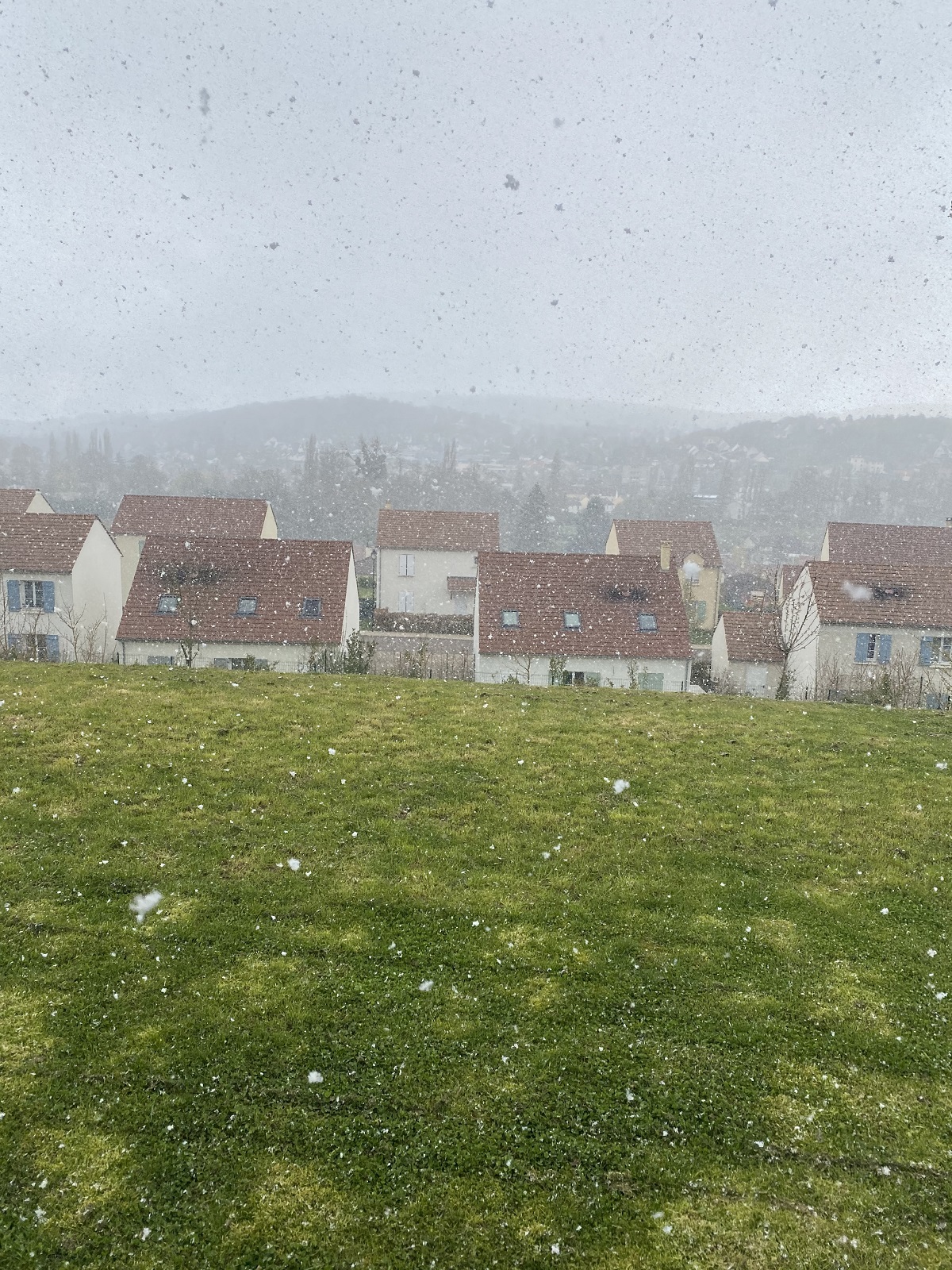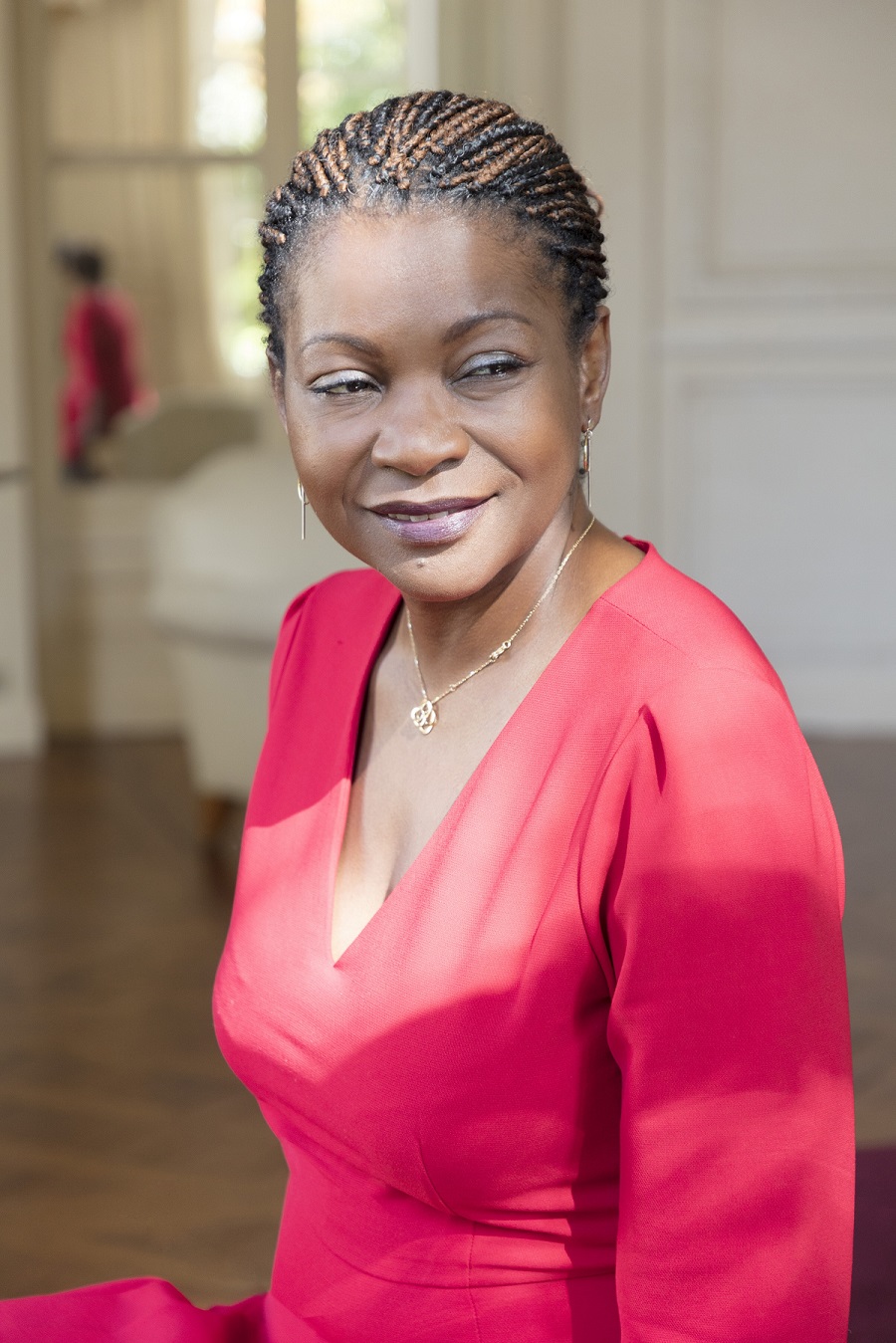La nature souveraine
Je m’étais promise de ne pas parler du Covid.
Mais comment faire là, aujourd’hui, dans notre maintenant anxiogène?
À ma fenêtre hier, en un quart d’heure, trois images : Soleil, neige, puis à nouveau soleil. Le temps de lever la tête, de s’occuper à autre chose : la météo changeante de nos vies si bien mise en scène par la nature. Cela n’est pas vraiment surprenant. « En avril ne te découvre pas d’un fil » dit la maxime. Ne pas faire confiance au ciel bleu, au soleil, tout peux arriver, là plus que jamais, tout ce qui ressemble au bonheur peut n’être qu’un leurre. En un battement de cil, un moment d’inattention et la neige, le froid, le gel que l’on pensait derrière nous figent l’instant.
Trouver la force de ne pas désespérer. peu importe les aléas, oui vraiment, car demain le printemps, la renaissance, les fleurs pressées d’éclore.
Je dors la fenêtre ouverte et j’habite dans un petit village, avec une église pas loin. Tous les matins, à 6h, j’entends les cloches. Et ces derniers matins, il y a les cloches, mais aussi les chants d’oiseaux. Avec les beaux jours, ils sont revenus les oiseaux, ils chantent à tue-tête, ils s’égosillent dès l’aurore.
Ils disent qu’à la nuit la plus sombre, succède toujours le plus radieux des matins. Qu’importe l’épaisseur de l’obscurité, le matin est une promesse jamais trahie, une espérance jamais démentie.
Je me réveille au son de la cloche de l’église, au chant joyeux des oiseaux, à l’idée que le soleil tiendra sa promesse. Je me réveille en confiance. Confiance en l’homme, en la nature souveraine. Confiance au présent et à l’avenir.
Protection de la nature, quelle extraordinaire arrogance… Nous les humains, comme nous sommes vains et comme nous habillons nos peurs de termes qui n’ont aucun sens. Dans les pires endroits du monde, la nature est souveraine, peu importe la forme qu’elle décide de prendre. Nous sommes mortels, la nature n’a tellement pas besoin de nous.
Les cloches de l’église, le chant des oiseaux, le soleil, la pluie, la neige et le gel, un nouveau matin, la promesse de renaissance ne fait pas défaut, c’est à nous d’en être digne ou pas.
Je n’ai pas parlé de Covid et j’en suis tellement fière.
Die eigenständige Natur
Es soll nicht um Covid gehen, das hatte ich mir versprochen.
Aber wie ist das in diesen beängstigenden Zeiten überhaupt möglich?
Gestern in einer Viertelstunde vor meinem Fenster drei Bilder: Sonne, Schnee und wieder Sonne. Zeit, den Kopf zu heben und sich anderem zuzuwenden: das wechselhafte Wetter unserer Leben, das die Natur so fabelhaft in Szene setzt. Das ist nicht wirklich überraschend. „April, April, der macht, was er will“, heißt es im Sprichwort. Dem blauen Himmel und der Sonne nicht trauen, alles ist möglich, jetzt mehr denn je, alles, was wie Glück aussieht, ist vielleicht nur eine Illusion. Innerhalb eines Wimpernschlags, einem Moment der Unaufmerksamkeit, lassen Schnee, Kälte und Frost, die wir längst hinter uns wähnten, den Augenblick erstarren.
Kraft finden, um nicht zu verzweifeln, egal welche Unwägbarkeiten es auch gibt, wirklich, denn morgen ist Frühling, Wiedererwachen, haben es Blumen eilig aufzublühen.
Ich schlafe bei offenem Fenster, wohne in einem kleinen Dorf unweit der Kirche. Jeden Morgen um 6 Uhr höre ich die Glocken. Die letzten Morgen gab es die Glocken und Vogelgezwitscher dazu. Mit den schönen Tagen kamen die Vögel wieder; sie singen aus vollem Hals, zwitschern ununterbrochen seit den ersten Morgenstunden.
Es heißt, dass auf die dunkelste Nacht der strahlendste Morgen folgt. Egal wie dicht die Dunkelheit auch ist, der Morgen ist ein ungebrochenes Versprechen, eine unwiderrufene Hoffnung.
Ich wache mit dem Glockenschlag der Kirche auf, mit dem fröhlichen Gesang der Vögel, mit dem Gedanken, dass die Sonne ihr Versprechen hält. Ich wache voller Vertrauen auf. Vertrauen in die Menschen und die eigenständige Natur. Vertrauen in die Gegenwart und die Zukunft.
Die Natur schützen, welch unglaubliche Arroganz… Wie wir Menschen doch unnütz sind und wie wir unsere Ängste in sinnlose Worte hüllen. An den schlimmsten Orten der Welt ist die Natur eigen-ständig, ganz egal, welche Form sie auch für sich wählt. Wir sind sterblich; die Natur braucht uns nicht.
Kirchenglocken, Vogelgezwitscher, Sonne, Regen, Schnee und Frost, ein neuer Morgen, an dem es nicht am Versprechen des Wiedererwachens mangelt; es ist an uns, sich ihm würdig zu erweisen oder nicht.
Es ging nicht um Covid und darauf bin ich überaus stolz.
Übersetzung: Jennifer Dummer
Sovereign Nature
I had promised not to speak of Covid.
But how to avoid it‚ in these anxious times in which we live?
In only a quarter of an hour at my window yesterday, I saw sun, then snow, and then sun again—all in the time it takes to glance up, to attend to something else. The changing weather of our lives, beautifully captured by nature. It’s the time of year, I suppose. ‘Ne’er cast a clout till May be out,’ as the saying goes. Don’t trust the sunny blue sky; anything might happen, especially now, in April; anything resembling happiness might prove to be an illusion. You only have to blink—you only have to lower your guard for a second, and the snow and cold and frost you thought were over will seize the moment.
Find the strength to resist despair. Don’t worry about the unknowns, really, because tomorrow it will be spring, with new life and blossoming flowers.
I live in a small village, not far from a church, and sleep with the window open. Every morning at six I hear the bells. These last mornings, I hear the dawn chorus, too. The birds are back, singing their heads off, fit to burst, as soon as day breaks.
They are saying that the darkest night is followed by the brightest dawn. No matter how thick the darkness, morning is a promise that is never broken, a hope that is never disappointed.
I wake to the sound of the church bells and the joyous singing of the birds—to the idea that the sun will keep its promise. I wake full of trust—in humanity and sovereign nature. In the present and the future.
Nature protection, what incredible arrogance. What vain creatures we humans are, and what nonsense we spout to hide our fears. In the worst places in the world, nature is sovereign, no matter what form it decides to take. We are mortal; nature has no need of us.
Church bells, birdsong, sun, rain, snow and ice, a new morning. There is no lack of promise; it is up to us to be worthy of it.
I haven’t spoken of Covid and I am very proud of myself.
Translation: Imogen Taylor
Teilen












